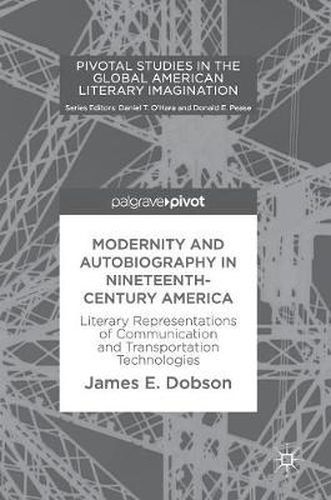Readings Newsletter
Become a Readings Member to make your shopping experience even easier.
Sign in or sign up for free!
You’re not far away from qualifying for FREE standard shipping within Australia
You’ve qualified for FREE standard shipping within Australia
The cart is loading…






This title is printed to order. This book may have been self-published. If so, we cannot guarantee the quality of the content. In the main most books will have gone through the editing process however some may not. We therefore suggest that you be aware of this before ordering this book. If in doubt check either the author or publisher’s details as we are unable to accept any returns unless they are faulty. Please contact us if you have any questions.
This book examines temporal and formal disruptions found in American autobiographical narratives produced during the end of the nineteenth century. It argues that disruptions were primarily the result of encounters with new communication and transportation technologies. Through readings of major autobiographical works of the period, James E. Dobson argues that the range of affective responses to writing, communicating, and traveling at increasing speed and distance were registered in this literature’s formal innovation. These autobiographical works, Dobson claims, complicate our understanding of the lived experience of time, temporality, and existing accounts of periodization. This study first examines the competing views of space and time in the nineteenth century and then moves to examine how high-speed train travel altered American literary regionalism, the region, and history. Later chapters examine two narratives of failed homecoming that are deeply ambivalent about modernity and technology, Henry James’s The American Scene and Theodore Dreiser’s A Hoosier Holiday, before a reading of the telephone network as a metaphor for historiography and autobiography in Henry Adams’s The Education of Henry Adams.
$9.00 standard shipping within Australia
FREE standard shipping within Australia for orders over $100.00
Express & International shipping calculated at checkout
This title is printed to order. This book may have been self-published. If so, we cannot guarantee the quality of the content. In the main most books will have gone through the editing process however some may not. We therefore suggest that you be aware of this before ordering this book. If in doubt check either the author or publisher’s details as we are unable to accept any returns unless they are faulty. Please contact us if you have any questions.
This book examines temporal and formal disruptions found in American autobiographical narratives produced during the end of the nineteenth century. It argues that disruptions were primarily the result of encounters with new communication and transportation technologies. Through readings of major autobiographical works of the period, James E. Dobson argues that the range of affective responses to writing, communicating, and traveling at increasing speed and distance were registered in this literature’s formal innovation. These autobiographical works, Dobson claims, complicate our understanding of the lived experience of time, temporality, and existing accounts of periodization. This study first examines the competing views of space and time in the nineteenth century and then moves to examine how high-speed train travel altered American literary regionalism, the region, and history. Later chapters examine two narratives of failed homecoming that are deeply ambivalent about modernity and technology, Henry James’s The American Scene and Theodore Dreiser’s A Hoosier Holiday, before a reading of the telephone network as a metaphor for historiography and autobiography in Henry Adams’s The Education of Henry Adams.